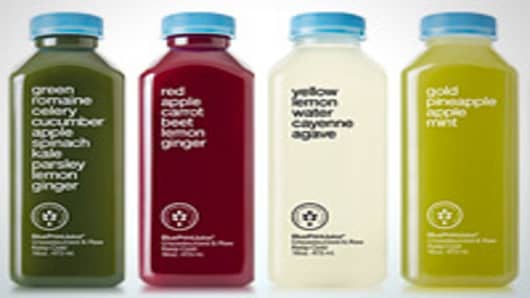Speaking of Los Angeles, juicing and cleansing are old news in La La land, but that doesn't mean sales have stalled. Pressed Juicery has grown from one store on LA's west side to a second store in West Hollywood and now a truck in Malibu. "It's a juice truck, and people love it there," says regional director of sales Jasmine Jacobson. "It's kind of a staple of the neighborhood."
Cleansing is not a cheap habit. Pressed Juicery's program costs $48.50, which buys you six servings of juice and two specialized waters. The average cleanse lasts three to five days, though it can go longer. Individual bottles of juice cost $6.50. "Sometimes people have a hard time wrapping their heads around, 'Well, it's just juice. Why is it $6.50?'" Jacobson says. "Yeah, it's just juice. We're talking unpasteurized juice — there's no additives, there's no preservatives, we've just pressed it this morning."
BluePrintCleanse's program costs $65 a day, with individual bottles costing $6 to $10. It's become a surprising hit on Wall Street, where the company's juice bottles are reportedly often spotted in the cafeteria at Goldman Sachs, even among men. Huss says that while 80 percent to 90 percent of her customers are female, "the male clients that we have are very loyal." She says men tend to cleanse in groups. "I think there's kind of a sense of brotherhood, camaraderie, competition, whatever you want to call it, but we definitely see significant numbers of groups of dudes drinking juice together."
Some doctors warn that juicing and cleanses should be done only in short spurts. As for losing weight, many juices, according to some reports have more sugar in them than sodas. Not only is the cleansing procedure expensive, it's hard. As Lisa Baumgartner was buying something to drink at Pressed Juicery this week — "a root drink, it has some greens in it" — we asked her if she's ever gone for the full cleanse.
"At my Buddhist center, people were doing it just to be healthy, so I tried it," she says. "But I only lasted three days because the smell of food would take over and I got, like, faint."
Email us at SmallBiz@cnbc.com
Follow us on Twitter @SmallBizCNBC




